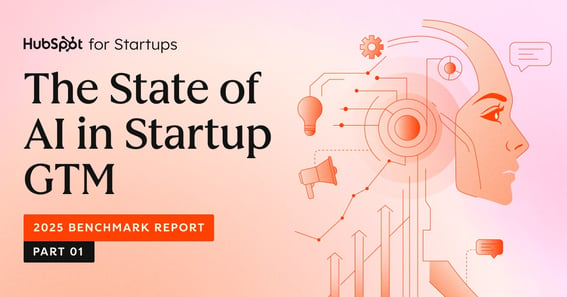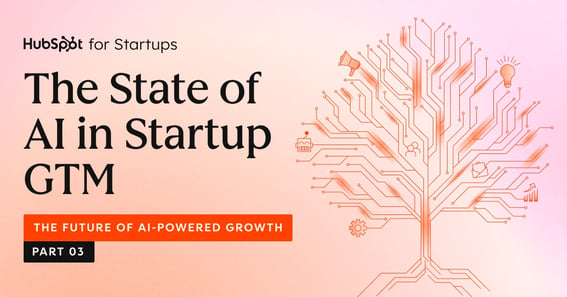Introduction
Businesses that fail to incorporate AI into their workplace risk falling behind their competitors. This is especially true for startups, which should be utilizing the latest technology to scale successfully.
According to the HubSpot for Startups AI in Startup GTM Strategy Report, 65% of startup founders have increased investments in AI since 2024. Those with a dedicated AI team are more likely to have an annual recurring revenue (ARR) of $5M to $20M, compared to startups without a dedicated AI team, which are more likely to have an ARR of less than $1M.
The data is clear: adopt AI and see improvements in sales and productivity, or rely on older technology and watch as your competitors scale past you.
In this guide, we’ll detail the benefits of incorporating AI into your startup workflows, how you can use AI for your startup, and how to measure AI performance.
TL;DR: AI office tasks for startups
- AI adoption drives revenue growth: 65% of startup founders increased AI investments since 2024, with startups having dedicated AI teams achieving $5M-$20M ARR compared to under $1M for those without AI integration
- Multiple workplace applications: AI automates administrative tasks, enhances customer support with 24/7 chatbots, personalizes marketing campaigns, and enables predictive analytics for smarter business decisions
- Measurable competitive advantages: 72% of respondents report AI increased upselling and cross-selling, while reducing operational costs, including customer acquisition and support expenses
- Five-step implementation framework: Assess organizational readiness, identify specific goals, research and test AI tools, train teams on effective usage, and continuously evaluate performance against key metrics
- Track critical success metrics: Monitor revenue growth, conversion rates, customer acquisition cost (CAC), customer lifetime value, employee productivity, and cost savings to measure AI impact on business outcomes
Benefits of AI in the workplace
There are numerous benefits to implementing AI in the workplace, especially for scrappy startups that want to deliver a personalized customer experience, improve employee productivity, and reduce costs.
Consider the following benefits of AI based on findings from the latest AI in Startup GTM Strategy Report.
- Increased revenue: 72% of respondents reported that AI helped increase upselling and cross-selling, and sales teams experienced some of the highest improvements after implementing AI.
- Leveraged data: Data is invaluable for startups looking to scale, and AI makes it easy to organize and analyze data for reporting. According to report respondents, enriching CRM data is one of the top three AI capabilities that has added value for sales teams. AI can help with just about anything, whether it’s reviewing market and competitor data, forecasting for your startup, or analyzing company performance.
- Improved customer experience: Startups may not have the budget to offer robust, 24/7 customer service or personalized outreach to each customer — unless, of course, they tap AI. AI enables startups to offer chatbots at any time, and AI can answer customer questions more efficiently when teams are busy with complex requests. AI can also utilize CRM data to build personalized follow-ups for a better experience for customers.
- Enhanced employee well-being: By reducing repetitive tasks, improving efficiency, and increasing revenue, AI is simultaneously improving employee well-being. Teams can spend less time on less engaging work and reduce the risk of burnout with the help of AI. AI can also expedite IT and HR requests and provide personalized training to enhance the employee experience.
- Competitive advantage: Looking to stand out from competitors? Not only will AI allow you to offer more personalized, efficient customer service, but it can also help you stand out to investors. Investors are looking for AI experts. Laura McGinnis, principal at Balderton Capital, explained the firm has spent the last 18 months “doubling down on AI expertise, being hyper-selective, and ensuring portfolio companies are positioned to withstand competition from both startups and incumbents.”
- Increased innovation: The entire point of a startup is innovation, but AI takes that creativity to the next level. Whether by reducing costs and improving efficiency, which creates more room for creativity, or by acting as a content sounding board with generative AI, this technology helps founders innovate in both their products and operations.
Where to use AI in the workplace
There are a wide range of ways to use AI in the workplace, from automating work to personalizing outreach to sorting and analyzing data. Cross off more from your never-ending to-do list by implementing AI for the following processes:
- Automated administrative tasks: AI tools can automatically schedule meetings and sales pitches, input sales and customer service data directly into your CRM, and handle routine communications, including emails and even phone calls.
- Enhanced customer support: AI chatbots enable businesses to offer 24/7 customer service trained on specific company data for quick, accurate responses, even when your team is offline.
- Intelligent recruitment processes: Scaling startups need to hire more people to handle higher sales and service request numbers, but they don’t have the budget to deal with high turnover from hiring employees that aren’t the right match. AI can improve resume screening and candidate matching to narrow your shortlist of interviewees, and personalized onboarding and training help new hires get up to speed efficiently.
- Predictive analytics for decision making: When considering when to launch a product, start a promotional sale, or expand into a new market, AI’s ability to quickly analyze data and predict trends can better inform your decisions. AI will parse company data, customer behaviors, and market trends, so that you are well-equipped with the right knowledge to make your next move.
- Personalized marketing campaigns: 24% of AI in Startup GTM Strategy Report respondents say that enhanced personalization is a top benefit for startup marketing. Personalization is also a huge benefit for sales teams, according to the report. AI can send personalized messaging to each customer based on purchase history and buyer intent, or you can use it to create tailored marketing content to different audience segments efficiently. More personalization equals better engagement and higher conversion rates.
- Resource management: For startups, the return on your investment in AI could be huge, especially because AI can help you monitor resources and reduce spending while maximizing revenue. From monitoring and reducing energy consumption to streamlining tasks, AI offers value by reducing operational costs. While AI implementation costs remain a top concern for startups, many are already experiencing lower operational costs, including reduced customer acquisition and support costs.
- Employee performance monitoring: AI tools can automatically track employee performance, offer personalized feedback, develop tailored training, and identify areas for professional development. AI’s performance monitoring and data can help startups with performance evaluations, upskilling, and promoting from within.
- Virtual collaboration tools: Whether your startup operates primarily from one office or has team members worldwide, AI makes virtual collaboration seamless and cohesive. Integrating AI into your communication methods can help automate scheduling, summarize meetings, translate communications, manage projects, and more.
How to implement AI in your startup
You’ve heard the benefits and explored some real-world ways to integrate AI into your workflows. But how do you actually get started with setting up AI for your startup?
While you could start purchasing AI tools and testing them, it’s better to start with a strategy to reduce time and money wasted on tools that may not work for your goals.
1. Assess readiness
First, take a comprehensive look at your business and identify any potential areas and teams that are ready for AI implementation. For example, is your customer service team spending a lot of time handling simple, repetitive inquiries? Could sales teams benefit from automation for lead qualification and follow-ups?
You’ll need to review business data to pinpoint any weaknesses in workflows or operations. Evaluate customer reviews, sales data, customer service interactions, and other company data to narrow down teams and processes that could use help from AI.
2. Identify goals
After assessing general readiness, set goals you want to achieve with AI. Maybe you want to increase the number of customer service requests your team handles per day by automating responses to simple questions, or you hope to increase conversion rates with more personalized sales and marketing content. Set goals and milestones to guide your AI strategy.
3. Research and test AI tools
Research AI tools and platforms dedicated to meeting the goals you’ve outlined, then begin testing those tools in your business operations. Tools like Breeze AI can integrate into your CRM for automated, personalized sales and service tasks. Other examples include PitchBob, which assists with building a pitch deck for investors, and Miro Assist, which improves the product development process.
4. Train your team
After researching and testing AI tools and determining which ones will help you achieve your goals, it’s time to incorporate these tools into your workflows and train employees on how to use AI effectively. Promote a positive attitude toward AI and address AI adoption challenges by ensuring your team understands that AI implementation is to alleviate their workload, not replace them.
5. Evaluate performance and reiterate as needed
Ensure your AI tools are working for you by measuring their impact on helping you achieve your goals. If your AI tools are falling short or don’t meet your needs as your startup grows and changes, don’t be afraid to swap tools for something that better suits your current needs.
Measuring the impact of AI integration
You wouldn’t add a new task to your workflow if you didn’t think it would help you reach a goal, right?
Similarly, you should only implement and continue using AI if the technology is moving your business toward specified goals, such as increasing revenue, growing market share, or improving customer experience.
When evaluating AI performance, watch these key metrics:
- Revenue growth
- Revenue per visit (RPV)
- Conversion rate
- Customer acquisition cost (CAC)
- Customer lifetime value
- Customer satisfaction
- Customer effort score
- Employee satisfaction
- Employee productivity
- Churn rate
- Average handle time for customer service
- Cost savings
- Time savings
- Market share growth
Implement AI to scale smartly
Integrating AI tools into your startup will help you stand out from competitors, improve productivity, and increase customer satisfaction, among many other benefits.
AI excels at handling data and repetitive tasks, allowing your startup team to focus more on personalized engagements and creativity, which can take your company to the next level.
Ready to learn more about how startups are incorporating AI in their GTM strategies? Check out the AI in Startup GTM Strategy Benchmark Report, then explore the AI in GTM Playbook and The Future of AI-Powered Growth: Trends & Predictions for 2026 to arm your startup with the AI knowledge needed to impress customers and investors and scale to new heights.




